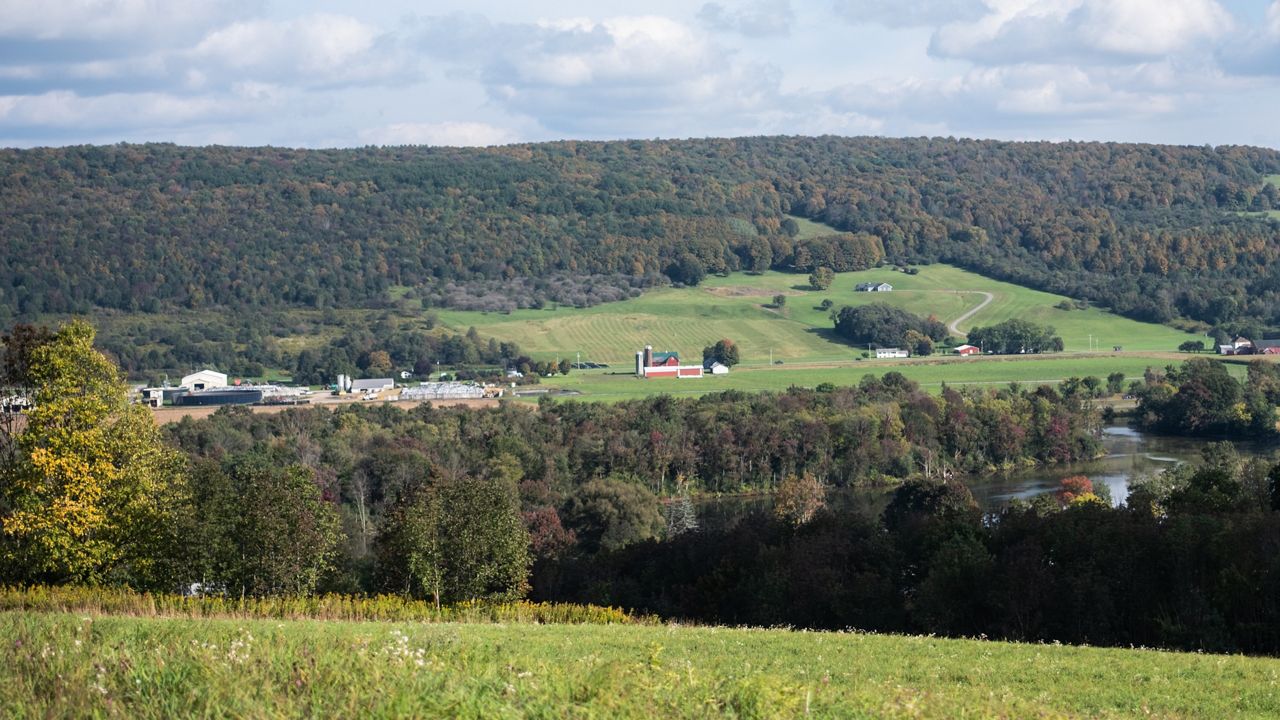More than 100 farms around New York will receive funding through the Climate Resilient Farming Grant Program with the aim to help address sustainability needs and reduce greenhouse gas emissions.
Gov. Kathy Hochul announced that nearly $16 million will be allocated to 116 farms through county Soil and Water Conservation Districts.
“New York’s agricultural industry is often faced with severe challenges associated with our changing climate, from flooding to droughts that impact their crops and their livelihoods,” Hochul said in a statement.
The funding will help farms implement projects in three different categories: livestock management for methane reduction, adaptation and resiliency projects to help farms deal with extreme weather events, and soil health which is meant to increase oil organic matter, reduce erosion and nutrient pollution in water ways and increase crop yields.
“Our farmers are the first witness of a changing climate, and they need our continued support to help scale the most effective methods for environmental stewardship and resilience against extreme weather,” state Sen. Michelle Hinchey, a Democrat and the chair of the Agriculture Committee.
Since the program began in 2015, 386 farms across the state have received almost $36 million in funding to build and implement sustainability practices on their farms.
Rick Villnave, a grain and produce farmer near Little York in Cortland County, has seen success in implementing cover crops on his 250-acre farm, a former ski slope prone to soil erosion. He said funding is necessary for these types of practices.
Villnave receives funding through the Cortland County Soil and Water Conservation District which helps him plant and maintain his cover crops each year. He receives approximately $60 per acre of cover crops.
“Let’s face reality, all commodity prices are low right now so for a farmer to dip into his pocket for some of these projects, it’s difficult to fund those projects without help,” Villnave said.
Over the years, Villnave has seen changes in the weather patterns that caused erosion on his farm.
“When you get 2 and ½ inches of rain that gets dumped in 15 minutes, we never used to get those storms in the past and now they just wash everything out,” he said.
“The Climate Resilient Farming Grant Program continues to provide real solutions in our battle to fight climate change and to provide protections to our farmers who face real hardship following the increasing number of severe weather events we have seen here in New York over the years,” New York Agriculture Commissioner Richard Ball said.
The cover crops help maintain soil health and prevent erosion with the root systems. Villnave said he has seen increased yields since implementing cover crops and save $10,000 on fertilizer as the soil retained more nitrogen.
“We are here to feed people so building our soil and preserving our soil is very important especially with the population getting bigger and bigger and the demand for increased production, that has to all go hand in hand,” Villnave said.
Officials say they are seeing weather patterns change over time and observing that a 10-year storm event occurs more frequently.
“This is why it is so important from the state of New York, it’s helping us be more resilient when we’re faced with that frequency of the 100-year and 500-year storm event,” Onondaga County Soil and Water Conservation District executive director Mark Burger said.
Seventeen farms in Central New York will receive funding and eight of them are in Onondaga County.
“We’re bringing in roughly 29% of the money that's being awarded to Central New York, and we’ve got farms across the six main watersheds that are receiving this funding,” Burger said.
The funding will be used for streambank stabilization projects to project drinking water supply and emergency protection in the watersheds, Burger said.
“Oftentimes people don’t think about rural communities and fire protection so not only are these water supplies important for livestock watering, but they’re also a primary source of water for fire protection in rural communities,” Burger said.
Additionally, the grant will be utilized by an egg farm in Onondaga County to improve the livestock water supply for their birds, and a dairy farm will implement another project for livestock water, Burger said.
“The water coming out of the ground is so cool that the farm is going to use it to cool the milk through a plate cooler and then that water, because it’s still clean and pure, is going to be reused as drinking water for the livestock,” he said.
Burger said these farms likely wouldn’t be able to implement these projects without funding from the state.
“It is very difficult to be able to move forward with environmentally conscious conservation projects while also trying to maintain your day-to-day existence,” he said.
Here how the $16 million will be allocated:
Capital Region: $1,221,092 to four farms
Central New York: $1,817,866 to 17 farms
Finger Lakes: $4,342,175 to 40 farms
Hudson Valley: $381,210 to five farms
Mohawk Valley: $2,804,446 to 12 farms
North Country: $1,283,743 to 11 farms
Southern Tier: $1,801,037 to 11 farms
Western New York: $1,469,802 to 12 farms



